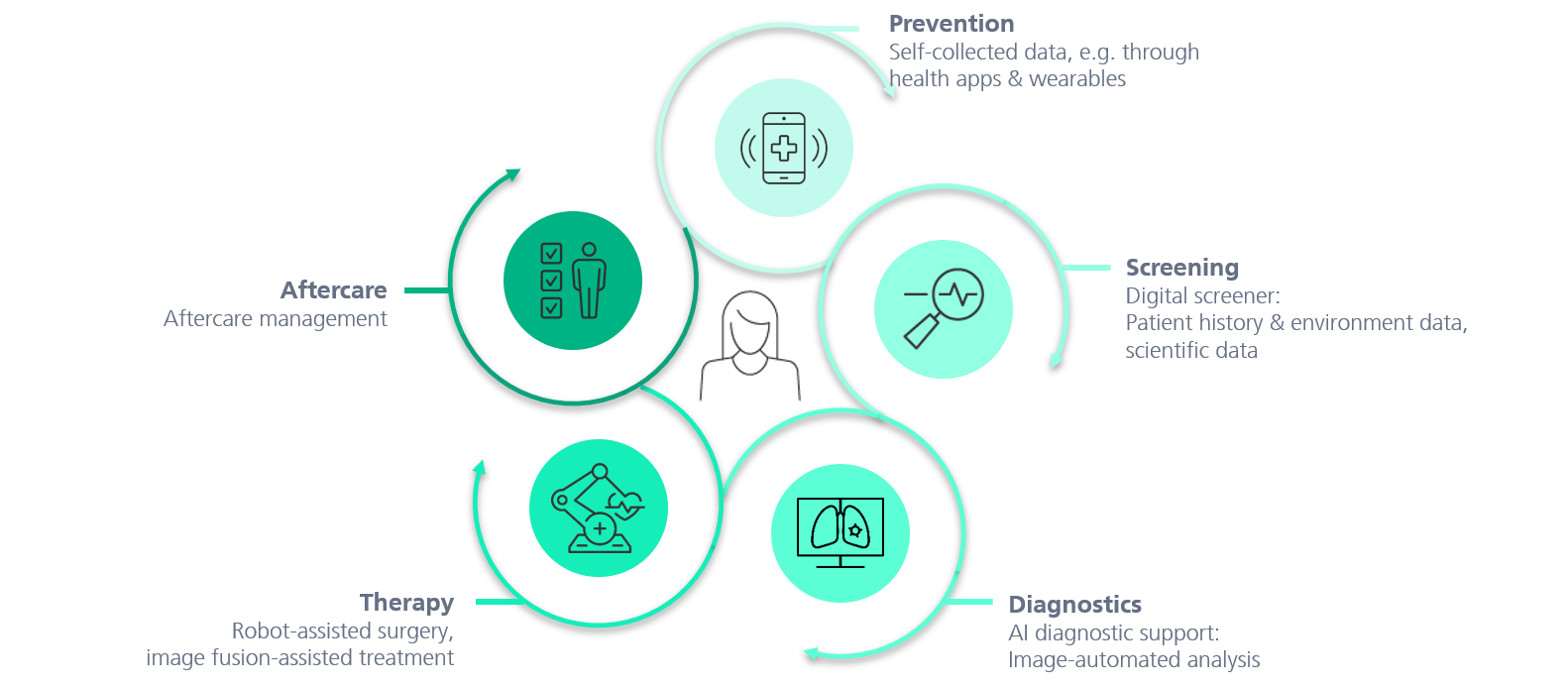Digitalization, automation and artificial intelligence (AI) are rapidly changing the healthcare sector. In clinics, hospitals and doctors' offices, electronic health records (EHR), data management systems, AI-supported evaluations, predictions and resource planning, robot assistants in the OR, intelligent assistants and many other technologies are on the rise. Doctors, healthcare professionals and patients are increasingly being supported by cognitive systems - from the initial telemedical consultation and AI-supported diagnosis to individualized therapy and aftercare at home. Digitally networking distributed patient data, public health data and data from health apps and smart wearables is the basis for individualized and optimized healthcare services.
Artificial Intelligence in Healthcare
How is AI used in healthcare? The digital patient journey
In the future, digital medicine and AI will accompany us as patients: From the prevention, screening, AI diagnosis and therapy to aftercare. This means that AI can be used to support patients and medical staff in every aspect of the patient journey.

Challenges for trustworthy AI in healthcare
Medical AI promises great potential for many fields of application, for example in medical diagnostics, drug development, administration and process management in hospitals and doctors' surgeries, resource and capacity planning, patient education and the training of healthcare professionals.
In order to use AI in healthcare, various technological and organizational challenges must be addressed appropriately, from the database and algorithm development to the practical application of AI systems.
Tabbed contents
The database
The database...
... has a significant influence on the quality of the AI system and is often the most time-consuming part of an AI project. Even before the actual algorithm development, collecting and preprocessing the data creates the necessary input to train and test the AI.
- Small amounts of data ("little data")
require special training and testing approaches in order to develop trustworthy AI models, e.g. in the case of rare diseases. - Multimodal data
often adds complexity to clinical decision making and requires specialized AI processing methods. - Distributed & particularly sensitive data
sensitive data often cannot be "simply" made available for the development of AI models, but require decentralized methods for secure data processing such as federated learning. - Data availability & quality
pose a major challenge in the case of rare diseases, for example, due to the scarcity of data.
The quality of the algorithm
The quality of the algorithm...
...is comparable to the known differences in quality between technology products
- Explainability of AI
even for specialists is not always given if suitable technical methods are not used to understand which data and factors are decisive for the AI's decision.
- Uncertainty & bias
are often the result of training on incomplete or inaccurate data, which can lead to uncertainty in the results of the AI model.
The use of AI
The use of AI...
...must be evaluated from use case to use case. The rule here is: it depends. Even a high-quality AI algorithm cannot always be easily transferred from one context to another. And the use of AI is not equally sensible and feasible for every use case.
- AI proofs of safety
are particularly important for critical application areas in order to ensure the reliability, quality and explainability of AI decisions. - Unknown scenarios
occur in reinforcement learning when the model is used outside the 'closed world' in which it was trained. Such cases can be identified via out-of-distribution detection.
Research on AI in healthcare at Fraunhofer IKS
Our focus: Trustworthy digital health
At Fraunhofer IKS, we conduct research in the following areas, with especial focus on development of trustworthy AI-based systems in safety-critical areas, such as healthcare.
- Optimizing patient journey: from screening and diagnosis to treatment and follow-up care
- Medical decision support and time series
- Clinical decision making based on causal inference
- Robot-assisted hospitals
- Data-efficient medical image processing in imaging and diagnostics
- Optimization of healthcare processes, such as hospital resource management
- Predictive maintenance of medical devices
- Visual quality inspection of medical devices
- Practical applications of quantum computing in healthcare
 Fraunhofer Institute for Cognitive Systems IKS
Fraunhofer Institute for Cognitive Systems IKS